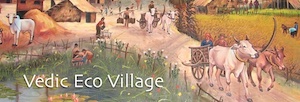The International Society for Krishna Consciousness, ISKCON, is one such Faith Based Organization belonging to the long-standing school of Vaisnavism. The Vaisnava cult is one of the primary cultural, spiritual, educational and social movements (sampradayas) descending from 13 the ancient Vedic tradition of India, going back many millenniums. Such teachings have been transmitted through an unbroken chain of preceptors, called Acaryas or Masters, whose main goal and purpose has been to preserve the Vedic knowledge intact and transmit such culture through the system of disciplic succession (guru parampara), from teacher to disciple.
The most prominent and recent preceptor who brought these teachings outside of India is His Divine Grace A.C. Bhaktivedanta Swami Prabhupada (referred to as Srila Prabhupada), the Founder-Acarya of the International Society for Krishna Consciousness (ISKCON) known colloquially as the Hare Krishna movement. Now for the first time in history, people from all walks of life, from all different religious backgrounds, people who had absolutely no connection with the Vedic culture have been brought within the fold of Vedic life and are seriously involved not only in their own personal daily practices of devotional service but also very much involved as well in spreading the teachings of the Vedas throughout the world.
In many ways transplanting from scratch the Vedic culture on a global scale was and continues to be a revolutionary, unparalleled and unprecedented cultural and social phenomena. Many scholars have extensively praised Srila Prabhupada during the short twelve-year period (1965 to 1977) of his spearheading the movement for his writing and publishing some 60 volumes of scholarly Vedic texts, the most ambitious being the classical Srimad-Bhagavatam. This he did through the Bhaktivedanta Book Trust (BBT), the publishing house he established in 1972 that has become the world's largest publisher of books concerning Krishna and the philosophy, religion, and culture of the Gaudiya Vaisnava tradition of India. And this he did during the advanced age of 70 when he arrived in America while travelling around the world 14 times opening over 100 temples and guiding and managing a worldwide federation of new practitioners.
Srila Prabhupada gave clear directives that the society he established is not only meant to be a religious organization but also a cultural, educational and social institution meant to help bring positive changes in general society. To this end ISKCON has the mandate of introducing the 14 social system of varnasrama dharma and this can more easily and more fully be implemented in rural areas where the natural economy based on land and cows is evident.
ISKCON has received many reviews from scholars and intellectuals from different countries attesting to their appreciation and praise of the works published by Srila Prabhupada through his Bhaktivedanta Book Trust. (Appendix 1)
The work of ISKCON has also been appreciated by the Prime Minister of India, Honorable Narendra Modi in the context of ISKCON’s Golden Jubilee celebrated in 2016. (Appendix 2)
The standard teachings being disseminated by the school of Vaisnavism are referred to as sanatana dharma, or the eternal principles or standard laws of mankind. In addition to providing spiritual guidance and training to society at large, the Acaryas also give practical instructions on how society should be organized and how its members should be educated. In other words, the training and education of individuals and the methodical organization of society form an integral part of the teachings that are also called varnasrama dharma and encompass both the spiritual and material dimensions of life.
Srila Prabhupada, as the Founder/Acarya of ISKCON, has chalked out Seven Purposes (Appendix 3) for developing his spiritual organization. The sixth of these seven purposes deals directly with the need “to bring the members closer together for the purpose of teaching a simpler, more natural way of life.” For most members of ISKCON this clearly means establishing rural communities, villages, where one can more easily introduce the concepts of “simple living and high thinking”, something truly in line with the Vedic culture, in particular an agrarian based culture. And although ISKCON has established some farm communities over the years, this dimension of the mission has still largely been undeveloped throughout the larger ISKCON family. There are various aspects to this and I will more elaborately explain these in Chapter Two when reviewing various Vedic literatures.
